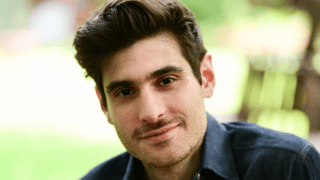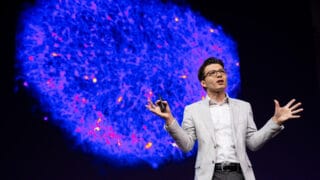The Lavin Agency Speakers Bureau
A speakers bureau that represents the best original thinkers,
writers, and doers for speaking engagements.
A speakers bureau that represents the best original thinkers,
writers, and doers for speaking engagements.
The key to leading happier, healthier lives? Better breathing.
There’s a secret to solving workplace stress and burn out. It’s surprisingly simple: breathe. According to science journalist James Nestor, breathing is the key to transforming our lives—more than diet, sleep, or exercise. Drawing on his instant New York Times bestseller Breath—which spent 20 weeks on the bestseller list and has sold over 3 million copies worldwide—James turns the conventional wisdom about our most basic biological function on its head. He teaches us that even slight adjustments to our breathing can profoundly improve workplace efficiency, athletic performance, anxiety, and sleep. Elizabeth Gilbert, author of Eat Pray Love, calls James’s work “a fascinating scientific, cultural, spiritual, and evolutionary history of the way humans breathe—and how we’ve all been doing it wrong for a long, long time.”
When we consider our health and well-being, we scrutinize the foods we eat or the amount of stress we’re under. Rarely, if ever, do we consider the ways we breathe—yet acclaimed science journalist James Nestor says that poor breathing habits are linked to a laundry list of chronic health problems and roadblocks to success: lost focus and concentration, anxiety, sleep issues, and even cavities and crooked teeth. James shows how we’ve lost the art of breathing properly, and teaches us how to get it back again.
In his landmark book Breath: The New Science of a Lost Art, James seeks out what went wrong and shows us how to fix it with a mix of science, humor, history, and simple, constructive takeaways. You’ll never breathe the same again. Brilliantly researched and utterly fascinating, Breath has earned praise from New York Times bestselling author Joshua Foer, who calls it a “transformative book that changes how you think about your body and mind.” Breath became an instant New York Times, Wall Street Journal, Los Angeles Times, and London Sunday Times bestseller, and has been translated into over 44 languages. It was awarded the Best General Nonfiction Book of the Year by the American Society of Journalists and Authors, and was a finalist for the Royal Society’s Best Science Book of the Year.
James Nestor artfully brings back what modern society has walked away from.Scientific Inquirer
James has spoken about the importance of proper breathing at the Stanford Medical School, the United Nations, and Global Classroom (World Health Organization+UNICEF), as well as more than 60 radio and television shows, including Fresh Air with Terry Gross, ABC’s Nightline, CBS Morning News, and dozens of NPR programs. To date, he has written for publications such as Scientific American, the New York Times, The Atlantic, and the San Francisco Chronicle, to name a few.
In his earlier book, DEEP: Freediving, Renegade Science, and What The Ocean Tells Us about Ourselves, James follows extreme athletes, adventurers, and scientists as they explore the ocean, uncovering weird and wondrous discoveries that redefine our understanding of both the ocean and ourselves. The book was a Finalist for the PEN American Center Best Sports Book of the Year, a New York Times Book Review Editor’s Choice, a BBC Book of the Week, and an Amazon Best Science Book of the year.
James has also teamed up with National Geographic Explorer and marine scientist David Gruber to create Project CETI—an ambitious undertaking to help us connect with and better understand the animals we share the planet with. Using technologies like machine learning and artificial intelligence, Project CETI hopes to one day crack interspecies communication, and was accepted as a TED Audacious Project.
James is the most engaging, humble, elegant journalist I have ever met. He was funny and serious and people are calling me nonstop today to thank me for bringing him here!
Brain BarLOVED James Nestor. He was terrific, friendly and very knowledgeable! He also is super easy to work with!
Balance Body Inc.In a 30 minute presentation to dental professionals, James Nestor enlightened our entire audience on the importance of breathwork, not only for ourselves but for our patients and team members. He also shared great explanations of why we have to do the things we do in dentistry–straighten teeth, expand arches, evaluate airways and the general disevolution of the human skull. Eye opening and certainly airway opening for all.
Henry Schein
Author, A Brief History of Intelligence AI Entrepreneur and Founder of Bluecore Forbes 30 Under 30 Honoree

New York Times Visionary in Medicine and Science Founding Director of Stanford Brain Organogenesis Knight of the Order of Merit
CEO of Phylagen, Inc. TED Senior Fellow

Author, Today Was Fun: A Book About Work (Seriously) Workplace Culture Expert Senior Advisor, SYPartners

Author, How to Make Your Brain Your Best Friend Neuroscientist with 2 Million Followers Across Social Media Platforms

Speaker on Stress and Leadership in the Workplace Columbia Business School Professor Host, TED Business Podcast Expert, Limitless with Chris Hemsworth

#1 New York Times Bestselling Author of Grit and Situated | Pioneering Researcher on Grit, Perseverance, and the Science of Success

Nobel Prize Winner | 3rd Most Cited Economist in the World | Bestselling Co-Author of Why Nations Fail and Power and Progress

Harvard Business School Behavioral Science Professor | "40 Under 40 MBA Professor" | Author of TALK: The Science of Conversation and the Art of Being Ourselves

#1 New York Times Bestselling Co-Author of Abundance | Host of thePlain English Podcast | CBS News Contributor

#1 New York Times Bestselling Author of How the Word Is Passed and Above Ground | The Atlantic Staff Writer
